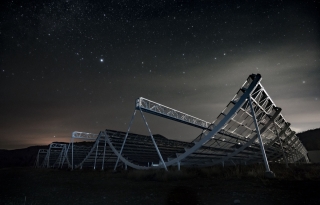In Canada, a new giant radio telescope has been launched to measure the expansion rate of the universe. The device was built for seven years.
On September 7th, the signals that came to us from space began to capture the new powerful Canadian radio-telescopes. CHIME (Canadian Hydrogen Intensity Mapping Experiment), because this is the name of the telescope, will help researchers to further explore the history of the universe and to detect radio signals generated by pulsars and gravitational waves, the existence of which was confirmed in 2016.

In terms of its appearance, CHIME looks a bit like an unfinished skatepark. The construction shown in the picture below, completed after 7 years of work, is designed to capture the weakest signals coming from all corners of the universe, and also to collect terabyte data per second every day. This means that the telescope is constantly creating and updating a huge three-dimensional space map. 50 researchers from the University of British Columbia, Toronto University, McGill University and the Canadian State Research Committee have started to work on the design concept of the project and no system was able to process such amounts of information. Fortunately, these systems have been developed over time. However, terabyte is still a crazy data resource - so it compresses files on CHIME drives before saving them.
Now that it is already working, CHIME can try to achieve its main goal: to measure the rate of expansion of the universe. If accurate measurement is achieved, researchers may finally be able to see what actually directs the process - so-called dark energy, or something else.
Photo from mcgill.ca
Hard to build a hockey rink on a surface with so much slope and curve
Downvoting a post can decrease pending rewards and make it less visible. Common reasons:
Submit
Hopefully they can find some things out - regarding the Rate of expansion.
Wonder how MUCH this #Telescope cost..?
Downvoting a post can decrease pending rewards and make it less visible. Common reasons:
Submit